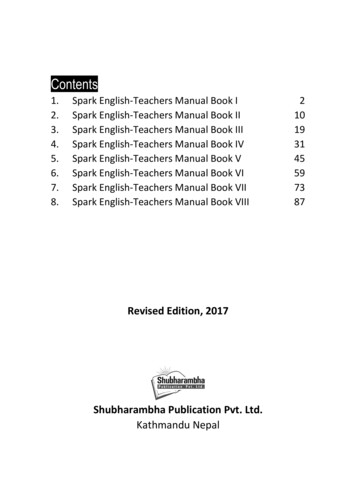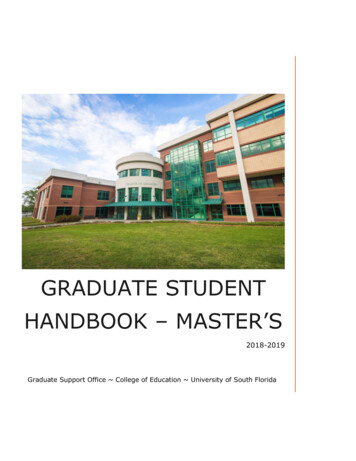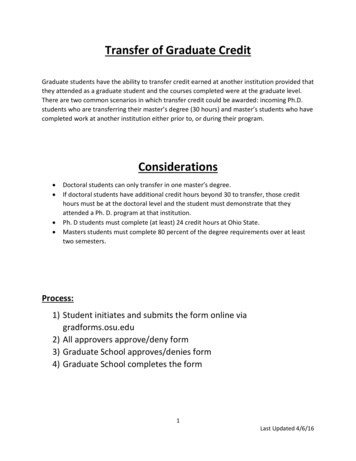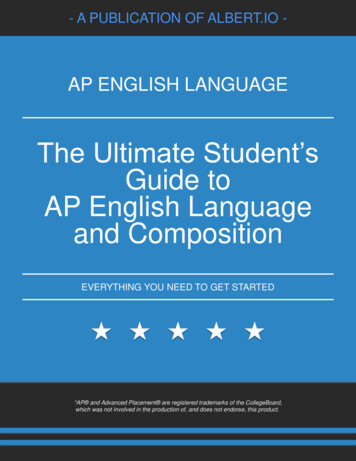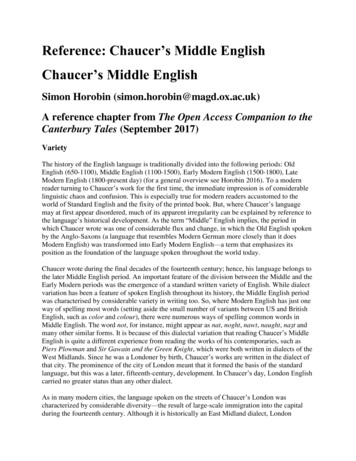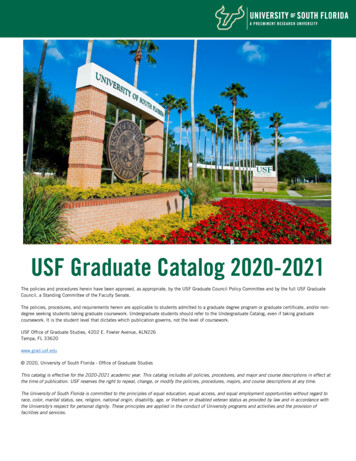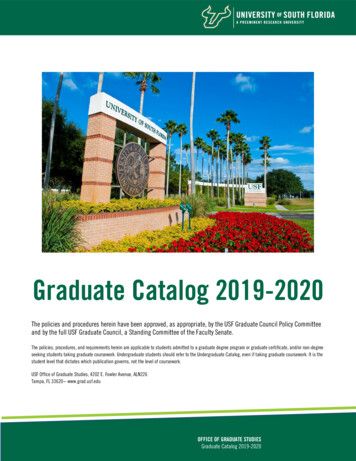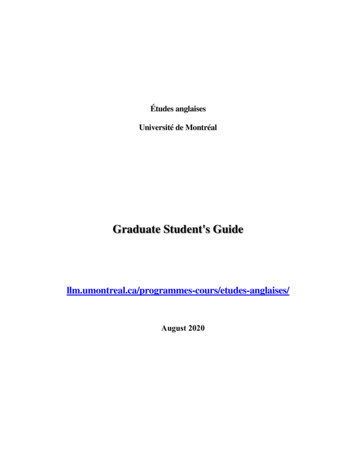
Transcription
Études anglaisesUniversité de MontréalGraduate Student's aises/August 2020
Table of contentsInformation for prospective graduate students . 3Application for admissionDeadlines for applicationnFinancial assistanceLanguage requirementsRegistration . . 5MA programs . . 7Requirements for admission to the MA programEquivalences: Degrees taken in English-language universitiesThe MA degreeRequirements and regulations for the MA degree (all types)Requirements and regulations for the MA with thesisMA thesis with a creative componentRequirements and regulations for the MA without thesisPhD program . . 12Requirements for admission to the PhD programmeRequirements and regulations for the PhD programmeThesisPhD Comprehensive ExaminationsGuidelines for PhD thesis prospectusCredits for Professional Development2
Information for prospective graduate studentsThe Department is located in the Pavillon Lionel-Groulx at 3150 Jean-Brillant, SuiteC- 8090. Written requests for information should be addressed to:English Studies Section Graduate SecretaryDépartement de littératures et de langues du mondeUniversité de MontréalC.P. 6128, succursale Centre-villeMontréal (Québec) H3C 3J7e-mail: info-etang@umontreal.caThe Director of Graduate Studies is Professor Heather Meek. Telephone requests shouldbe directed to the Graduate Secretary: 514 343-5736. Fax: 514 343-6443.Application for admissionTo apply for graduate admission the student should fill out the official graduate admissionon line at : tmlThe application form along with the application fees, birth certificate, 3 letters of reference(from professors in the field of literary studies), letter of intent, writing sample (10 to 20pages), official copies of the transcripts and thesis proposal (for prospective PhD students)should be sent to the following address:Registrar’s officeUniversité de MontréalC.P. 6205 succursale Centre-villeMontréal (Québec) H3C 3T5CanadaStudents can also bring their documents to the Registrar’s Office at:Université de MontréalService de l’admission et du recrutementPavillon J.-A.-DeSève, 3e étage2332, boul. Édouard-MontpetitMontréal (Québec) H3T 1J4Deadlines for admissionThe deadlines for application are February 1 (for September) and September 1 (forJanuary). Late applications for September may be considered until May 1 if the dossier iscomplete and there are still places in the programme. There are no late applications forJanuary.3
Financial assistanceA: Bursaries and Scholarships:The Department offers its best doctoral students four-year funding packages comprisinggrants, teaching assistantships and research assistantships. All applicants for full-time studywhose applications are received by February 1 are automatically considered for thesefellowships. The Department’s ceiling for graduate student funding is 15,000. When astudent is awarded a grant from an organisation such as SSHRC and FQRSC, theDepartment revisits its funding package so that the total funding that student receivesdoes not exceed 15,000. The Department offers a limited number of part-time teachingjobs to PhD students, most often after completion of their course work andcomprehensive exams.Residents of Quebec may be eligible for financial aid under the government's programmeof loans and bursaries or for the Bourses d'excellence offered by FQRSC (Fondsquébécois de la recherche sur la société et la culture). PhD candidates who are residentsof Canada may apply for fellowships offered by SSHRC (Social Sciences andHumanities Research Council). The deadlines are in September or October. Students intheir final undergraduate year should apply through their home universities.PhD students who are Canadian or permanent residents do not pay out-of-province fees.Students from other countries may apply to their governments or to such bodies as theAssociation of Commonwealth Universities. In addition, citizens of many foreign countriesmay be exempted from the foreign student tuition fees through programs administered bytheir embassies. These countries include many of South America and several Frenchspeaking countries. (See Étudier à l’Université de Montréal and Guide du candidat étrangerfor further information, at : nationaux/index.htmlB: Alma Mater Travel Fund: Eligibility and terms:All requests must be submitted in advance of the planned travelOnly travel expenses can be reimbursed to a maximum of 400Grants are intended primarily for PhD students registered en rédactionLimit of 1 grant per studentConference paper must be linked to the main area of doctoral research Deadlines for submitting travel fund applications:January 15 (for conferences in February, March, April, May)May 15 (for conferences in June, July, August, September)September 15 (for conferences in October, November, December, January)(If the 15 falls on a weekend, the following Monday)Application procedure:The application consists of a form submitted to the English Studies Section as well asseveral supporting documents e-mailed to the director of graduate studies. The studentshould ask her/his supervisor to forward a brief letter of support to the director of4
graduate studies.Submit to the English Studies Section: Form providing a realistic estimate (ticket price) of travel, signed by the student.If grant is awarded, original receipts plus all boarding passes in the case of flights(following travel).E-mail to the director of graduate studies (in a single e-mail): conference call for paperscopy of the accepted abstract/proposalstatement explaining how the paper relates to student’s doctoral researchletter of acceptance or copy of the conference programme (can also be submitted inpaper form)brief letter from supervisor attesting to student’s progress and relevance of conferencepaper to thesis researchLanguage requirementsGraduate courses in English are given entirely in the English language, but, because theofficial language of this University is French and the vast majority of its students andprofessors francophone, prospective students must have some working knowledge ofFrench. We expect our students will want to participate in the life of the university.Working in the Department and the University, both anglophone and francophonestudents are able to live in a milieu that has few parallels in North America; the presenceof the 2 languages is the principal cultural phenomenon that makes the milieuexceptional.Students may be required to take a test consisting of the translation of a short passagein French. Those who do not pass the test may be asked to take one or more courses inthe French language. Candidates for whom English is not a native language may berequired to show competence in oral and written English by means of aproficiency test. Depending on the nature of their thesis projects, PhD candidates may berequired to show proficiency in a 3rd language.RegistrationRegistration is held 3 times a year (for fall, winter and summer) in the English StudiesSection office usually in May, August and December. At their 1st registration newstudents work out a “plan global d'études” in consultation with the director of graduatestudies. Over the course of their MA or their PhD program, students should take nomore than 2 courses with any 1 professor. PhD students may take 1 directed readingcourse. However, directed reading courses must be approved by the graduate committeeand the professor directing the reading course must submit a syllabus to the graduatecommittee. (Directed reading courses are not offered to MA students.) Exceptions requirethat the student write a letter to the Graduate Studies Committee.Course changes and cancellations are allowed until mid-September for fall and mid-Januaryfor winter; students should consult the Calendrier universitaire for the specific dates. All of5
these changes must be made with the Graduate Secretary. Students who are unable tosubmit papers by their professor's deadline should inform their professor and must file a“demande de délai” with the graduate secretary. Extensions will be granted inexceptional cases only.Courses outside the Department: For either the MA or PhD program, students may take 1course outside the Department. Exceptions require that the student write a letter to theGraduate Studies Committee.Courses such as the following might be approved:1) A course in English literature at another university which is not at the time available inour department.2) A course in French literature, comparative literature, art history or cinema at thisuniversity.3) Any other course, either in this university or elsewhere, which is demonstrably relevantto the student's individual program.Courses taken before entering the program: Up to two courses in total taken as étudiantlibre at the Université de Montréal may be credited as part of an MA or PhD programme,provided that they have received grades of at least B. In the case of re-application afterleaving the programme, only courses previously taken within 10 years of the re-applicationwhich have received a grade of at least B may be credited toward the new program.6
MA programsRequirements for admission to the M.A. programmeTo be accepted into the M.A. programme the student must possess:a) B.A. in English (spécialisé or majeur) from this university, with a grade-pointaverage of at least 3.3, or an equivalent degree from another university. The studentshould have taken at least one advanced undergraduate course in each of thefollowing fields: 19th-century British literature19th-century American literature20th-century British literature20th-century Canadian literature20th-century American literatureb) Aptitude for advanced literary studies, which the department will evaluate in thelight of the following materials (submitted in English), which should be sent with theapplication: c)3 letters of referenceundergraduate transcriptsa letter of intent (1-2 pages)a 10-20 page writing sampleStudents who have not taken courses in all the above-mentioned areas, or whosepreparation is otherwise considered inadequate, may be required to do additionalcourse work. If no more than 2 extra courses (6 credits) are required, they areconsidered “complementary” and do not affect the time limit for completing theprogramme; if more than 2 courses are required, they are called “preparatory,” andextra time is allowed to complete them.Equivalences: Degrees taken in English-language universitiesBA honours: the usual BA Honours degree, generally involving 20 or more courses (60credits) in English, will be acceptable for admission to the MA, provided the student hastaken prerequisite courses in literature equivalent to those offered in the Université deMontréal programme.BA with major in English: this degree will be acceptable for admission to the MA if thestudent has at least 42 credits in English, including the equivalent prerequisite courses.BA general or BA minor in English: students will be expected to have taken at least 18credits in English and 18 in related fields. Those students will normally have to take a fullyear of work at the undergraduate level.7
The MA degreeThe MA with thesis (“avec mémoire”) or “travail dirigé” is a normal prerequisite fordoctoral studies. The MA with internship (“avec stage”) provides training for a variety ofoccupations in the fields of culture, publishing, public relations, and CEGEP teaching.Students in this option benefit from both academic and professionnal supervision. The MAwith internship (“avec stage”) is not considered a preparatory degree for doctoral studies.All students are registered in the MA without thesis in the 1st instance. Those whowould like to write a thesis need to submit their thesis proposal and bibliography,along with the form "Enregistrement de sujet de recherche".The MA with thesis requires 15 credits of course work and a thesis (between 50 and60 pages including bibliography).The MA without thesis offers 2 possibilities: the MA with “travail dirigé” (24 credits ofcourse work and 21 credits for a revised and expanded essay written in the context of astudent’s course work); and the MA with “stage” (24 credits of course work, 15 credits forthe stage and 6 credits for the student’s written report on the stage).Requirements and regulations for the MA degree (all types)The passing mark for each course is C; a minimum grade-point average of 2.7 must bemaintained for course work as a whole. Failure in more than 2 courses eliminates a studentfrom the programme. After failing 1 course, a student may take the same course again if it isoffered, replace the failed course by a different course, or redo some or all of the work of theoriginal course. The maximum grade for the failed course or its replacement is C (Article56). Penalties for plagiarism are detailed in the Règlement disciplinaire concernant leplagiat.Required course: All MA students are required to take ANG 6032 - Modern LiteraryTheory.Time limit: A full-time student must complete all requirements for the degree in 6 terms (2years). A half-time student has 9 terms (3 years). This limit may be extended by 1 or 2 termsfor students who are required to take “preparatory courses.” Upon request, and with therecommandation of the research supervisor, a student may be granted an extension of 1 year.Students may seek permission to suspend their registration for up to 3 terms; time spent insuspension does not count toward the 6 or 9 term time limit.8
Requirements and regulations for the MA with thesisCourse work: 1 year of full-time study or 2 years of half-time study, during which timestudents complete 15 credits.Deadlines for applying to the MA with thesis:A student must have secure a director for his or her thesis before the end of the 1st term.The head of the English Studies Section and/or the director of graduate studies willcounsel students about potential directors when they enter the program.A student’s application to do an MA thesis must be submitted to the Graduate StudiesCommittee by the end of the 2nd term.The deadline for students who begin in September is April 15.For students who enter the program in January, the deadline is August 15.A summer start is rare but for those who begin in May, the deadline is December 15.In order to allow for feedback from the research director, the student should submit acomplete draft of the proposal and a bibliography to the research directorseveral weeks in advance of this deadline.Application to the MA with thesis consists of: 2-page single-spaced, thesis proposal3-5 page preliminary bibliography of the principal primary and secondary textsESP form “enregistrement du sujet de mémoire” (found on the ESP website)This application is evaluated by the Graduate Studies Committee, which may require thatit be revised before being approved.Format of MA thesis proposal:The proposal should be 2 pages, single-spaced, 12 pt. with 1 inch margins. It is written inessay form and should include the following:1. Topic and thesis statement2. State of research on the topic: A concise survey of what has been written on thetopic, especially in recent years3. Contribution of thesis to the field4. Methodology: Theoretical / methodological approach(es), especially if the topic ishistorical or generic in focus9
5.Provisional table of contents and chapter outline: Indicate briefly what is to beachieved in each chapter and which chapter you have submitted as a sample.MA Thesis:Students receive 3 credits for researching their thesis project. For best results, studentsshould maintain close contact with their thesis directors, reporting regularly ontheir progress. The thesis is an initiation to research, not a lifetime project; 50 to 60 wellargued pages are normally sufficient. For correct formatting of the thesis, pleaseconsult the University's guidelines in the Guide de présentation et d'évaluations desmémoires de maîtrise et des thèses de doctorat. The Guide is available on line at thisaddress:www.esp.umontreal.ca/A full-time student registered in the thesis option should be able to complete a thesis in1 term, and receive the degree after 4 or 5 terms in the Department. After completion,the thesis is evaluated by a jury of three professors (including the student'ssupervisor), and defended orally by the student.MA thesis with a creative componentWith approval from the Graduate Studies Committee and the support of their director,students can include a creative component in their MA thesis. Their creative work canconstitute up to 50% of the thesis. The balance of the thesis discusses the creative workand/or provides a theoretical or literary critical complement. The sample chapter for acreative MA thesis can be a piece of creative writing as long as the place of that writingwithin the thesis is clearly delineated in the chapter outline in the proposal. The proposalfollows the usual 2-page structure and makes clear both the conceptual/theoreticalframework for the thesis and the relationship of that framework to the creative writing.Students applying for this option require one full-time faculty member to serve as thesisdirector.Requirements and regulations for the MA without thesisCourse work: 24 credits of course work and a minimum of one year of full-time study orthe equivalent at half-time. Most students will need an additionnal term to complete thecourse work.Travail Dirigé:In a student’s final term, s/he will revise and expand one term paper written for 1 ofhis/her courses. (The professor who gave the course may serve as the director of thetravail dirigé.) The revision of the paper is meant to raise it to a professional level, at ornear publication quality. It should be 25 to 30 pages, be well-focussed, develop a clearand coherent argument, reflect the relevant scholarship, and respect MLA Handbookguidelines for documentation.The paper should be given to the Graduate Secretary at least 2 months in advanceof the student’s deadline for completing the degree. The Graduate Committee willappoint 2 professors to evaluate the paper (one of whom is the professor for whom theessay was originally written).10
Stage:a) A student’s written request to do a stage must be submitted to the Graduate StudiesCommittee by the end of the 2nd term. The deadline for students who begin inSeptember is April 15. For students who enter the program in January, the deadline isAugust 15. (A summer start is rare but for those who begin in May, the deadline isDecember 15.) Once the letter is approved by the grad chair and 1 professor (who willact as “UdeM supervisor”), the student is considered in the option Stage.b) During the final term of coursework, the student determines where s/he will do thestage and finds a stage supervisor in the milieu where the stage will take place. Incollaboration with the stage supervisor, the student fills out the forms which formalizetheir agreement and include the duties of the intern and the responsibilities of the host.c) The student submits the forms to the graduate secretary for approval by the grad chairand the UdeM supervisor. Because there are budgetary considerations, the forms haveto be approved by all parties before the stage can begin.d) Once the forms are approved, the student is registered “en redaction de rapport” andwill have this status until s/he submits a report (at which point s/he will be registered“en correction”). If the stage takes place in the winter term, for example, the reportwill be submitted by the end of June and graded during the summer term; if the stagetakes place in the fall term, the report will be submitted by the end of January andgraded during the winter term.e) The stage normally takes place over a period of 15 weeks, 1 term, and is theequivalent of 60 contact hours. (The student is not a replacement worker and thesupervisor retains full responsibility.)f) The role of the stage supervisor is to support and guide the student as well as to writea report evaluating the student’s skills (professionalism, initiative, autonomy, etc).Once the report is received by the Graduate Secretary, the stage supervisor is paid 500 by UdeM. The grad chair “accepts” or “refuses” the stage on the basis of thestage supervisor’s report.g) Following the stage (15 credits), the student has 1 month to submit to the graduatesecretary a 15-18 page report (6 credits): 35% of the report should describe the stageand 65% should analyse the stage, especially what the student learned about theprofession, about English studies, about the corpus addressed, etc. This report isgraded by the UdeM supervisor and one other professor.11
PhD programRequirements for admission to the PhD programTo be accepted for the PhD program the student must possess:a)An MA in English from UdeM or its equivalent from another university with anaverage of at least 3.3. Outstanding MA candidates may be admitted to the PhDprogramme after completion of MA course work.b)Aptitude for advanced literary studies, which the Department will evaluate in thelight of letters of reference, transcripts, a letter of intent, a 10-20 page writingsample, and a research proposal which should be sent with the application.Requirements and regulations for the PhD programTime limit: A full-time student must complete all requirements for the degree in 15 terms (5years). A student who registers at half time for part of his studies is allowed 18 terms (6years). Upon request, a student may be granted an extension of 1 year. Also, students arepermitted to suspend their registration for a maximum of 3 terms; time spent in suspensionis not part of the 15 or 18 term time limit.Registration: 2 years of full-time registration, or 1 year of full-time registration and 2 yearsat half-time, during which students must complete 15 credits of course work, including acourse in literary theory. The passing mark for each course is C; a minimum grade-pointaverage of 2.7 must be maintained for course work as a whole. Failure in any courseterminates the candidacy of a PhD student. If the Graduate Studies Committee considers thata student's performance is unsatisfactory for any reason, it may recommend to the dean thatthe student be dropped from the programme. Upon the completion of all required coursework and examinations, a student is registered “en rédaction de thèse,” for which the feesare substantially lower.12
ThesisThesis directors are agreed upon at the beginning of a student's enrollment. In the (rare) caseof a change in thesis director, it is the responsibility of the student to inform his/her formerdirector as well as the chair of the Graduate Studies Committee of the change.A PhD thesis normally consists of about 200-250 pages. For correct formating of the thesis,please consult the University's guidelines in the Guide de présentation et d'évaluations desmémoires de maîtrise et des thèses de doctorat. This guide is available at the bookstore oron line: on completion, the PhD thesis is evaluated by a jury consisting of 3 professors from theDepartment and 1 from outside the university. The final step is a public oral defence.Procedure for submitting thesis proposal: During the 1st year in the program – on June1 for those who began in September and on November 1 for those who began in January –a student must submit a 2-page, single-space research proposal, the ESP form“enregistrement du sujet de recherche” (to be found on the ESP website), a 5-8 pagepreliminary bibliography and the 2 examination reading lists.The research proposal should include:- specific, focused and feasible research question(s) and objectives- clear description of the proposed methodology- significance and expected contributions to researchPhD comprehensive examinationsThe comprehensive examinations consist of: 2 written field examinations A thesis prospectus and chapterAn oral examination Deadlines: The comprehensive exams must be completed by the end of the student's 6thterm in the programme: 2 full years, whether the student is full-time or half-time. This is aFaculty of Graduate Studies deadline and no extensions are possible.Students who start their program in the fall submit their research proposals and readinglists by June 1 of their first year, while students who start their program in January submittheir research proposals and reading lists by November 1 of their 1st year.13
End of year 1:2-page proposal (with 5-8 page bibliography) and 2 reading lists of 25-30 entries each.Half-way through year 2:Part 1 of the exam takes place over a 2-week period: In-class exam [day 1] at 9 am (scheduled to end at 3 pm)Take-home exam: questions received by student at noon a week later [day 8], with thetwo exams due a week later [day 15 of the process]End of year 2:Part 2 of the exam takes place over a 2-3 week period: Prospectus and one chapter are due on day 1 of the processOral exam on the prospectus and chapter scheduled by the committee 2-3 weeks laterStudents who begin the PhD program in September (fall term) must submit their proposaland reading lists the following May. On December 1st of their second year in the program, part 1 of the exam begins: in-classexam on December 1st ; questions emailed to student for the take-home exam onDecember 8th; essays submitted by student via email on December 15th. (These dates areadjusted if they fall on a weekend.)On May 1st of the following year, part 2 of the exam begins: prospectus and one chaptersubmitted; the oral exam takes place 2-3 weeks later. (This date is adjusted if it falls on aweekend.)If a student does not pass part 1 in December, s/he will resit the exam the following February. Ifa student does not pass part 2 in May, s/he will resit the exam in August of the same year (to bedone within 2 years of their entry in the program).Students who begin the PhD program in January (Winter term) must submit their proposaland reading lists in December of that year. On June 1st of their second year in the program, part 1 of the exam begins: in-class examon June 1st; questions emailed to student for the take-home exam on June 8th; essayssubmitted by student via email on June 15th. (These dates are adjusted if they fall on aweekend.)On November 1st of the same year, part 2 of the exam begins: prospectus and one chaptersubmitted; the oral exam takes place 2-3 weeks later. (This date is adjusted if it falls on aweekend.)If a student does not pass part 1 in June, s/he will resit the exam in August of the same year. If astudent does not pass part 2 in November, s/he will resit the exam in January of the followingyear (to be done within 2 years of their entry in the program).14
1) In-class and take-home examsFor the in-class portion of the examination, the student must answer 3 out of 5 questions in 6hours. For the take-home portion of the examination, the student must answer 2 out of 3questions. (The student receives the questions on a designated day at noon and submits two12-15 page essays one week later before 3 p.m.). Like graduate seminar papers, the essays mustinclude critical secondary material, develop a logical argument, and demonstrate thecandidate’s command over his or her chosen field of examination. The essays should bedouble- spaced and written in Times 12.The student chooses which field exam is written in class and which one is written at home.This choice should be indicated in the letter to the Graduate Studies CommitteeDeadlines and procedures for submitting field lists: Students who start their program in the fall (September) submit lists by June 1st Students who start their program in the winter (January) submit lists by November 1stThe student, in consultation with her/his thesis director, writes a letter to the GraduateStudies Committee proposing the reading lists for each field exam. The letter should makeclear when the student intends to write the exams, which field exam will be taken inclass and which field exam will be taken at home. Exams in fields other than those listedbelow are possible with the permission of the Graduate Studies Committee. Renaissance literatureLiterature from 1660 to 1800British romantic literatureVictorian literature19th-century American literatureEarly 20th-century British literatureLate 20th-century British literatureEarly 20th-century American literatureLate 20th-century American literatureAfrican-American literatureCanadian literatureQuebec literaturePostcolonial literature and theoryCriticism and theoryGender and sexuality studies15
2) PhD thesis prospectus and chapterStudents are strongly encouraged to follow the guidelines outlined below (for theprospectus) and to submit drafts of their prospectus and chapter to their supervisor at least6 weeks in advance of the exam period in order to get their feedback. They should alsoanticipate having to make some revisions following the oral examinationGuidelines for PhD thesis prospectus: A PhD prospectus must include the following:1) Topic and thesis statement.2) State of research on the topic: A concise survey of what has been written about thistopic, especially in recent years.3) Contribution to the field: How the thesis will add to, or develop, knowledge in thechosen field; how it differs in approach, scope, or perspective from what has beenwritten.4) Methodology: Theoretical/methodological approach(es), especially if the topic ishistorical or generic in focus.5) Provisional table of contents and chapter outline: Not just a table of contents, but aparagraph-long abstract of each chapter. (It is, of course, normal for chapters to bereorder
travel. expenses can be reimbursed to a maximum of 400 Grants are intended primarily for PhD students registered . en rédaction Limit of 1 grant per student Conference paper must be linked to the main area of doctoral research. Deadlines for submitting travel fund applications: Ja


